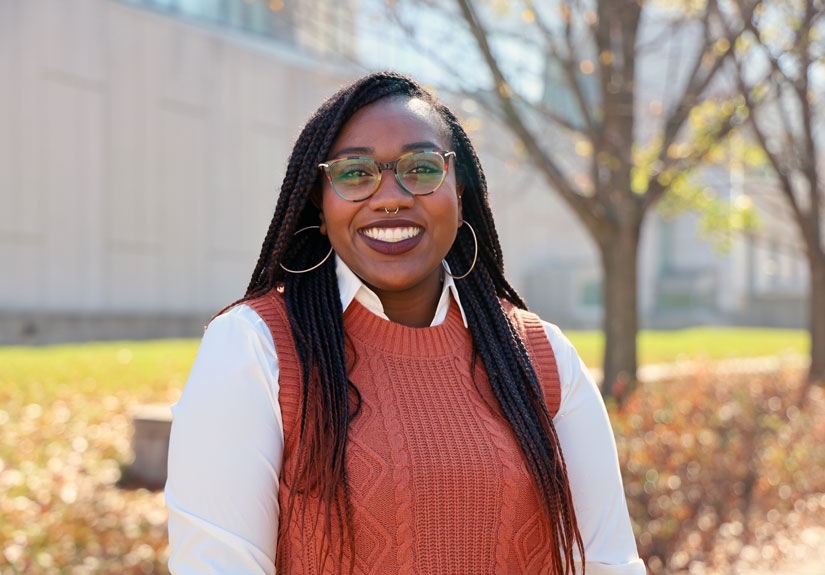Public Health Buckeyes: Kaitlyn Jones
MPH student dreams of becoming a city health commissioner

Meet Kaitlyn Jones, MPH health behavior and health promotion student, who was drawn to programs in both the College of Public Health and the College of Social Work for their strong focus on advocacy, social justice and policy change.
Question and Answer
Why did you decide to pursue public health at Ohio State?
Public health allowed me to find my “why” in the work that I do every day. I started out as an undecided freshman taking an intro to global health course with Amy Ferketich. One of her first assignments was for us to document everything that we did from sunup to sundown and to explain how public health efforts and/or interventions played a role in our ability to thrive. My passion for community health arose from my sociology track when I started to learn and understand more about population health disparities. My concept of community shifted from not only seeing Ohio State as my community but allowing the city of Columbus to be my home and a place where I wanted to see change and health equity.
Your academic path brings together social work and public health. How do you think the merging of these fields shapes your perspective?
Social work and public health are two fields that work together to accomplish a very similar goal of ensuring optimal care for every person in the community. Public health allows me to consider factors such as plain language and language justice, health literacy, program and fiscal management, and evidence-based practices while social work has afforded me the knowledge of strength-based perspectives, systems change, motivational interviewing, crisis management and even understanding some diagnostic practices.
I value that both fields embrace and require advocacy, social justice and policy change. The layering of perspectives provides me an opportunity to enhance collaboration and stress the importance of the presence of both fields.
You’ve done work related to birth equity and maternal health through various roles. What makes you passionate about these topics?
Growing up, I was raised in a matriarchy. For most of my childhood, I had my mother, aunts, grandmother and great-grand mother be some of the strongest influences on my life. I always found beauty in Black motherhood but also knew that it came with its challenges. When I learned that Black mothers and their babies were three to four times more likely to die from childbirth or within the first year of life in Ohio, I was flabbergasted. Every Black mother and her baby deserves to feel the joy, excitement and beauty of having a safe and happy pregnancy, delivery and postpartum. When I see the mothers and their children, I see my family and even a future me with children of my own. From research to community outreach, I see a value in uplifting the voices and experiences of Black women in my community to improve the care for our future generations.
What are your goals after completing your degree?
I have accepted a position at the Colorado School of Public Health as an evaluation specialist for the Community Organizing for Prevention (COFP) team in Denver. Working with the Colorado Department of Public Health and Environment, COFP is a statewide initiative that takes an upstream, primary prevention approach to reducing substance misuse and violence among youth through a shared risk and protective factors approach rooted in deep equity and systems change using evidence-based practices. I would love to be able to work as a medical social worker at a children’s hospital in Denver at a later point.
In the long term, I have a strong ambition to obtain my DrPH and become a city health commissioner. I am very passionate about supporting the future leaders of public health as well, so I am hoping to be able to give back to my hometown, West Hartford, Connecticut, and my alma mater through continuing to mentor and stay engaged in those communities.
What advice would you give to students considering a degree in public health?
I cannot stress the importance of getting involved enough. Explore the work being done in the college, at the university, in the city, in the state and even the country. Take time to volunteer and be engaged in the community. Theories are taught in the classroom, but they should not live there. Use the skills you acquire over time to build a well-rounded and comprehensive view of your work.
For all students, I encourage you to reach out to professors whose work captivates you and listen to their journey on how they got into the field. Finding your “why” can help drive the work that you do, and in public health, your career does not have to be linear.
About The Ohio State University College of Public Health
The Ohio State University College of Public Health is a leader in educating students, creating new knowledge through research, and improving the livelihoods and well-being of people in Ohio and beyond. The College's divisions include biostatistics, environmental health sciences, epidemiology, health behavior and health promotion, and health services management and policy. It is ranked 22nd among all colleges and programs of public health in the nation, and first in Ohio, by U.S. News and World Report. Its specialty programs are also considered among the best in the country. The MHA program is ranked 5th and the health policy and management specialty is ranked 21st.